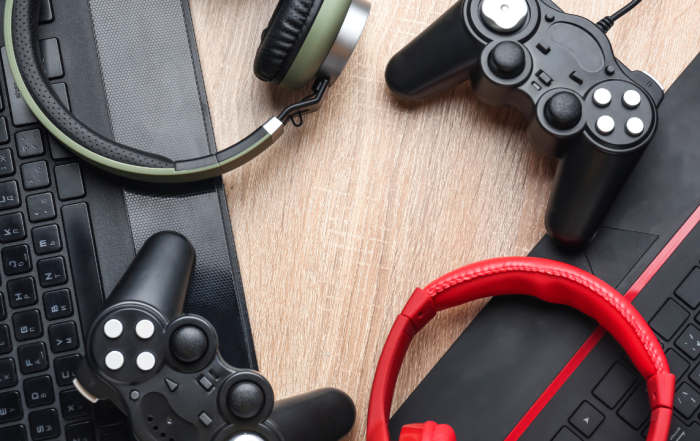Building Your Game Plan – A Roadmap for WINNING MORE in Esports
The best game plan for your esports training will vary depending on the game and the individual’s skill level. However, some general tips for building a training game plan in esports include:
- Setting clear goals and creating a plan to achieve them.
- Practicing regularly and consistently.
- Watching and studying professional players and teams.
- Joining a team or finding a practice partner.
- Analyzing your own gameplay through replays or recordings.
- Staying up to date with the current meta and strategies for the game.
It is also important to maintain a healthy balance between training and taking care of yourself physically and mentally.
→ Setting Your GAME PLAN Goals
Here are some tips for setting clear goals and creating a plan to achieve them in esports:
- Start by identifying specific, measurable, and achievable goals (S.M.A.R.T. Goals). For example: “increase my win rate by 5% in the next month” or “reach Diamond rank in the next season.”
- Break down your goals into smaller, manageable tasks. For example, if your goal is to increase your win rate, you can set smaller goals such as “improve my map awareness” or “play 10 games per day.” Esports Tower Starter Club offers free rec league games and monthly coaching clinics.
- Create a schedule or plan that outlines how you will work towards your goals. This should include specific tasks, deadlines, and a timeline for achieving each goal.
- Identify any potential obstacles or challenges that may arise and plan how you will overcome them.
- Keep track of your progress and adjust as needed. Review your plan and goals regularly to ensure you are on track and make any necessary changes.
- Be specific about the outcome you desire, having a clear idea of what you want will help you focus on what is important.
- Don’t be afraid to fail, it is a part of the learning process, you learn what works and what doesn’t, and it will make you better.
- Stay motivated, remind yourself of your goals and why you are doing this, and reward yourself when you achieve something.
Remember, goal setting and planning is an ongoing process and requires regular review and adjustments to ensure you stay on track.
Helpful Downloads → Goal Setting & Tracking Worksheets
→ Creating Your Practice GAME Plan
Here are some examples of how to practice regularly and consistently in esports:
- Set a schedule: Create a schedule that includes dedicated time for practice and stick to it. For example, practice for 2 hours every day from Monday to Friday, and 4 hours on Saturday and Sunday.
- Focus on one aspect at a time: pick one specific aspect of the game that you want to improve on and practice it until you have mastered it.
- Play against better players: Playing against better players will help you improve faster and understand your own weaknesses.
- Analyze your game: After each game, take some time to analyze your gameplay, watch replays or demos, and take note of your mistakes and what you can do to improve.
- Warm up before playing: Take some time to warm up and get in the right mindset before playing, this will help you perform better.
- Play a variety of game modes: Playing different game modes will help you understand the game better and improve your versatility.
- Take breaks: Take regular breaks to avoid burnout, and make sure to get enough rest and take care of yourself physically and mentally.
- Participate in tournaments or leagues: Participating in tournaments or leagues can provide you with a sense of competition and a more realistic practice environment.
Remember, consistency is key, try to practice as much as you can, but also be mindful of taking breaks and avoiding burnout.
Tips for Watching and Studying Professional Players and Teams in Esports
- Watch live streams and recorded matches: Watch live streams and recorded matches of professional players and teams to observe their gameplay, strategies, and decision-making.
- Take notes: Take notes on what you observe, such as a player’s positioning, item choices, or map control.
- Watch replays: Watch replays of professional matches, this will allow you to pause, rewind, and watch specific moments, and also analyze the players’ positioning, decision making, and actions.
- Learn from professionals: Learn from professionals, try to understand why they make certain decisions, what they do in certain situations, and try to implement that in your own gameplay.
- Follow tournaments and competitions: Follow tournaments and competitions to stay up to date on the current meta, strategies and to see what the best teams and players are doing in the game.
- Watch analysis and commentary: Watch video analysis and commentary by experts, to gain a different perspective, and to understand the game better.
- Study the best players in your role or role specific: Study the best players in your role, or role-specific, to understand the skills and techniques that are specific to your role.
- Learn from different regions: Watch and learn from different regions, different regions may have different playstyles, strategies, and metas, learning from them will make you a more versatile player.
Remember, the key is to watch, analyze and learn, don’t just watch to enjoy the game, but watch to learn, take notes, and try to implement what you learn in your own gameplay.
→ Tips for Creating a Schedule or GAME Plan to Achieve Your Goals in Esports
- Start by identifying specific, measurable, and achievable goals. (S.M.A.R.T. Goals) This will give you a clear idea of what you want to achieve.
- Break down your goals into smaller, manageable tasks. This will make it easier for you to focus on what you need to do to achieve your goals.
- Create a schedule or plan that includes specific tasks, deadlines, and a timeline for achieving each goal. Be realistic about the time you need to achieve each task.
- Identify any potential obstacles or challenges that may arise and plan how you will overcome them. This will help you to stay on track and achieve your goals.
- Prioritize your tasks. Focus on the most important tasks first, and then move on to the less important ones.
- Use a planner or calendar. Write down all your tasks, deadlines and schedule in a physical or digital planner or calendar, this will help you to stay organized and on track.
- Review and adjust your schedule regularly. Review your plan and goals regularly to ensure you are on track and make any necessary changes.
- Be flexible, things may not always go as planned, be willing to make changes and adjust your schedule as needed.
- Don’t try to do too much at once, be realistic about what you can achieve in a day or a week, and don’t overload yourself.
Remember, the key is to be S.M.A.R.T. – specific, be realistic and be flexible, having a clear and achievable plan will help you focus on what is important, stay on track and achieve your goals.
Examples of Schedules for Specific Tasks, Deadlines, and Timelines for Achieving Your Esports Goals
- Goal: Increase win rate by 5% in the next month.
- Task 1: Improve map awareness.
- Deadlines: Watch and analyze 5 replays per week for the next 4 weeks.
- Task 2: Improve aim
- Deadlines: Practice aim drills for 1 hour every day for the next 4 weeks.
- Task 3: Improve decision making
- Deadlines: Watch and analyze 5 professional players’ replays per week for the next 4 weeks.
- Timeline: 4 weeks.
- Task 1: Improve map awareness.
- Goal: Reach Diamond rank in the next season.
- Task 1: Improve macro play
- Deadlines: Watch and analyze 3 replays of professional players per week for the next 8 weeks
- Task 2: Improve team play
- Deadlines: Play 5 games with a team per week for the next 8 weeks
- Task 3: Improve map control
- Deadlines: Practice map control drills for 1 hour every day for the next 8 weeks
- Timeline: 8 weeks
- Task 1: Improve macro play
- Goal: Improve mechanical skills
- Task 1: Improve aim
- Deadlines: Practice aim drills for 1 hour every day for the next 6 weeks
- Task 2: Improve movement
- Deadlines: Practice movement drills for 1 hour every day for the next 6 weeks
- Task 3: Improve reflexes
- Deadlines: Practice reflex drills for 1 hour every day for the next 6 weeks
- Timeline: 6 weeks
- Task 1: Improve aim
These are just examples, and your schedule will depend on your goals and your current skill level. Remember, to be specific, realistic, and flexible and adjust as needed.
→ Analyzing Your Own Gameplay
Replays or recordings are an important step in improving your skills in esports. Here are some tips for analyzing your own gameplay:
- Watch replays or recordings immediately after playing: It’s best to watch your replays or recordings as soon as possible after playing, this way you can remember what you did and what you were thinking during the game.
- Take notes: Take notes on what you observe, such as your positioning, decision-making, and actions.
- Focus on specific areas: Focus on specific areas of your gameplay that you want to improve, such as your aim, map awareness, or decision-making.
- Compare yourself to professional players: Compare yourself to professional players to see how your gameplay stacks up and understand what you need to improve on.
- Identify patterns Identify patterns in your gameplay, such as mistakes you repeatedly make or areas where you struggle.
- Look for opportunities: Look for opportunities in your gameplay, such as moments when you could have played differently and improved your chances of winning.
- Use tools: Use tools such as demos, replays, or overlay software, these tools allow you to see things from different angles, measure your stats, and provide more information.
- Communicate with your team: Communicate with your team after the game, discuss what went well and what didn’t, and work on improving your teamwork.
Remember, analyzing your own gameplay is an ongoing process and requires regular review and adjustments to ensure you are on track and you are making progress.
→ Stay Up to Date with the Current Meta and Strategies for the Game
An important aspect of improving your skills in esports is staying up to date. Here are some tips that can help:
- Follow professional players and teams: Follow professional players and teams to see what strategies and tactics they are using.
- Watch tournaments and competitions: Watch tournaments and competitions to see how the best players and teams are playing the game and what strategies they are using.
- Join online communities: Join online communities related to your game, such as forums, Discord channels, or Reddit, to stay up to date on the latest strategies and meta.
- Read guides and articles: Read guides and articles written by experts to understand the current meta and strategies.
- Practice new strategies: Practice new strategies and tactics you learn, try them out in different game modes and situations to understand how to use them effectively.
- Communicate with your team: Communicate with your team, discuss new strategies and tactics, and work together to implement them in your gameplay.
- Don’t be afraid to experiment: Don’t be afraid to experiment with new strategies and tactics, it’s okay to make mistakes and try new things.
- Keep an open mind: Keep an open mind and be willing to adapt to changes in the meta, it’s important to stay flexible and be able to adjust your gameplay as needed.
Remember, the meta and strategies are constantly changing, so it is important to stay informed and adapt your gameplay accordingly to stay competitive.
The Esports Tower Advantage
At Esports Tower our club players are provided support and a clear path to reach their goals – whether that be to join a collegiate Varsity team or enter the ranks of the pro circuit. The time is now. You need to create a game plan and work your plan. Going it alone you’ll only go so far. True professional athletes are supported by organizations that will challenge them to grow into the top performers of tomorrow.
- Improve skills: Training programs can help players improve their skills by providing structured practices, drills, and exercises.
- Increase knowledge: Training programs can increase players’ knowledge of the game, strategies, and meta.
- Build teamwork: Training programs can help players build teamwork by practicing together and working on strategies as a group.
- Enhance mental toughness: Training programs can help players develop mental toughness by practicing under pressure and learning how to handle stress.
- Increase motivation: Training programs can increase players’ motivation to improve by providing clear goals and a sense of progress.
- Identify weaknesses: Training programs can help players identify their weaknesses and work on improving them.
- Access to professional coaches: Training programs can provide players with access to professional coaches who can provide guidance and feedback on their gameplay.
- Create a schedule: Training programs can provide players with a schedule to follow, which can help them stay on track and achieve their goals.
It is important to keep in mind that not all training programs are created equal, and it is important to research and find a program that is tailored to your needs, goals, and skill level.




Get Social